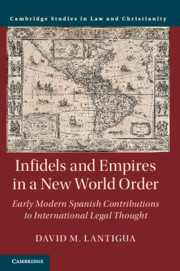 Infidels and Empires in a New World Order
Infidels and Empires in a New World Order from Part II - God, Empires, and International Society
Published online by Cambridge University Press: 11 June 2020
How did European thinking about interactions with peoples of the Indies move from Christian-infidel relations to an identifiably modern form of international relations? This chapter explores the preceding question by looking at the emergence of Protestant empires during the seventeenth-century and the ascendant neo-Stoic Christian legal humanism structuring new ideas of world order and providential commerce. It considers the growing ideological displacement of the legal category of the infidel, and the associated crime of idolatry, in the political context of the Indies, East but especially West. This chapter also addresses normative ideas about the savage that developed in the infidel’s wake. Although there were important differences between the Iberian empires and the new English and Dutch empires, there were also continuities. This chapter considers those similarities between Spanish religious thinkers and representative international thinkers on natural law and the law of nations such as Alberico Gentili, Hugo Grotius, Samuel Purchas, New England Puritans, and John Locke. What does the colonization of North America look like in light of Valladolid’s legacy from a century earlier?
To save this book to your Kindle, first ensure [email protected] is added to your Approved Personal Document E-mail List under your Personal Document Settings on the Manage Your Content and Devices page of your Amazon account. Then enter the ‘name’ part of your Kindle email address below. Find out more about saving to your Kindle.
Note you can select to save to either the @free.kindle.com or @kindle.com variations. ‘@free.kindle.com’ emails are free but can only be saved to your device when it is connected to wi-fi. ‘@kindle.com’ emails can be delivered even when you are not connected to wi-fi, but note that service fees apply.
Find out more about the Kindle Personal Document Service.
To save content items to your account, please confirm that you agree to abide by our usage policies. If this is the first time you use this feature, you will be asked to authorise Cambridge Core to connect with your account. Find out more about saving content to Dropbox.
To save content items to your account, please confirm that you agree to abide by our usage policies. If this is the first time you use this feature, you will be asked to authorise Cambridge Core to connect with your account. Find out more about saving content to Google Drive.